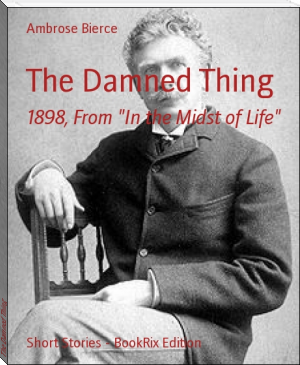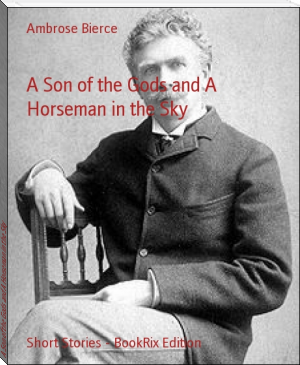Can Such Things Be? by Ambrose Bierce (popular books of all time .TXT) 📖

- Author: Ambrose Bierce
Book online «Can Such Things Be? by Ambrose Bierce (popular books of all time .TXT) 📖». Author Ambrose Bierce
To each and all, the peace that was not mine.
III--STATEMENT OF THE LATE JULIA HETMAN, THROUGH THE MEDIUM BAYROLLES
I had retired early and fallen almost immediately into a peaceful sleep, from which I awoke with that indefinable sense of peril which is, I think, a common experience in that other, earlier life. Of its unmeaning character, too, I was entirely persuaded, yet that did not banish it. My husband, Joel Hetman, was away from home; the servants slept in another part of the house. But these were familiar conditions; they had never before distressed me. Nevertheless, the strange terror grew so insupportable that conquering my reluctance to move I sat up and lit the lamp at my bedside. Contrary to my expectation this gave me no relief; the light seemed rather an added danger, for I reflected that it would shine out under the door, disclosing my presence to whatever evil thing might lurk outside. You that are still in the flesh, subject to horrors of the imagination, think what a monstrous fear that must be which seeks in darkness security from malevolent existences of the night. That is to spring to close quarters with an unseen enemy--the strategy of despair!
Extinguishing the lamp I pulled the bed-clothing about my head and lay trembling and silent, unable to shriek, forgetful to pray. In this pitiable state I must have lain for what you call hours--with us there are no hours, there is no time.
At last it came--a soft, irregular sound of footfalls on the stairs! They were slow, hesitant, uncertain, as of something that did not see its way; to my disordered reason all the more terrifying for that, as the approach of some blind and mindless malevolence to which is no appeal. I even thought that I must have left the hall lamp burning and the groping of this creature proved it a monster of the night. This was foolish and inconsistent with my previous dread of the light, but what would you have? Fear has no brains; it is an idiot. The dismal witness that it bears and the cowardly counsel that it whispers are unrelated. We know this well, we who have passed into the Realm of Terror, who skulk in eternal dusk among the scenes of our former lives, invisible even to ourselves and one another, yet hiding forlorn in lonely places; yearning for speech with our loved ones, yet dumb, and as fearful of them as they of us. Sometimes the disability is removed, the law suspended: by the deathless power of love or hate we break the spell--we are seen by those whom we would warn, console, or punish. What form we seem to them to bear we know not; we know only that we terrify even those whom we most wish to comfort, and from whom we most crave tenderness and sympathy.
Forgive, I pray you, this inconsequent digression by what was once a woman. You who consult us in this imperfect way--you do not understand. You ask foolish questions about things unknown and things forbidden. Much that we know and could impart in our speech is meaningless in yours. We must communicate with you through a stammering intelligence in that small fraction of our language that you yourselves can speak. You think that we are of another world. No, we have knowledge of no world but yours, though for us it holds no sunlight, no warmth, no music, no laughter, no song of birds, nor any companionship. O God! what a thing it is to be a ghost, cowering and shivering in an altered world, a prey to apprehension and despair!
No, I did not die of fright: the Thing turned and went away. I heard it go down the stairs, hurriedly, I thought, as if itself in sudden fear. Then I rose to call for help. Hardly had my shaking hand found the doorknob when--merciful heaven!--I heard it returning. Its footfalls as it remounted the stairs were rapid, heavy and loud; they shook the house. I fled to an angle of the wall and crouched upon the floor. I tried to pray. I tried to call the name of my dear husband. Then I heard the door thrown open. There was an interval of unconsciousness, and when I revived I felt a strangling clutch upon my throat--felt my arms feebly beating against something that bore me backward--felt my tongue thrusting itself from between my teeth! And then I passed into this life.
No, I have no knowledge of what it was. The sum of what we knew at death is the measure of what we know afterward of all that went before. Of this existence we know many things, but no new light falls upon any page of that; in memory is written all of it that we can read. Here are no heights of truth overlooking the confused landscape of that dubitable domain. We still dwell in the Valley of the Shadow, lurk in its desolate places, peering from brambles and thickets at its mad, malign inhabitants. How should we have new knowledge of that fading past?
What I am about to relate happened on a night. We know when it is night, for then you retire to your houses and we can venture from our places of concealment to move unafraid about our old homes, to look in at the windows, even to enter and gaze upon your faces as you sleep. I had lingered long near the dwelling where I had been so cruelly changed to what I am, as we do while any that we love or hate remain. Vainly I had sought some method of manifestation, some way to make my continued existence and my great love and poignant pity understood by my husband and son. Always if they slept they would wake, or if in my desperation I dared approach them when they were awake, would turn toward me the terrible eyes of the living, frightening me by the glances that I sought from the purpose that I held.
On this night I had searched for them without success, fearing to find them; they were nowhere in the house, nor about the moonlit lawn. For, although the sun is lost to us forever, the moon, full- orbed or slender, remains to us. Sometimes it shines by night, sometimes by day, but always it rises and sets, as in that other life.
I left the lawn and moved in the white light and silence along the road, aimless and sorrowing. Suddenly I heard the voice of my poor husband in exclamations of astonishment, with that of my son in reassurance and dissuasion; and there by the shadow of a group of trees they stood--near, so near! Their faces were toward me, the eyes of the elder man fixed upon mine. He saw me--at last, at last, he saw me! In the consciousness of that, my terror fled as a cruel dream. The death-spell was broken: Love had conquered Law! Mad with exultation I shouted--I MUST have shouted, "He sees, he sees: he will understand!" Then, controlling myself, I moved forward, smiling and consciously beautiful, to offer myself to his arms, to comfort him with endearments, and, with my son's hand in mine, to speak words that should restore the broken bonds between the living and the dead.
Alas! alas! his face went white with fear, his eyes were as those of a hunted animal. He backed away from me, as I advanced, and at last turned and fled into the wood--whither, it is not given to me to know.
To my poor boy, left doubly desolate, I have never been able to impart a sense of my presence. Soon he, too, must pass to this Life Invisible and be lost to me forever.
A DIAGNOSIS OF DEATH
"I am not so superstitious as some of your physicians--men of science, as you are pleased to be called," said Hawver, replying to an accusation that had not been made. "Some of you--only a few, I confess--believe in the immortality of the soul, and in apparitions which you have not the honesty to call ghosts. I go no further than a conviction that the living are sometimes seen where they are not, but have been--where they have lived so long, perhaps so intensely, as to have left their impress on everything about them. I know, indeed, that one's environment may be so affected by one's personality as to yield, long afterward, an image of one's self to the eyes of another. Doubtless the impressing personality has to be the right kind of personality as the perceiving eyes have to be the right kind of eyes--mine, for example."
"Yes, the right kind of eyes, conveying sensations to the wrong kind of brain," said Dr. Frayley, smiling.
"Thank you; one likes to have an expectation gratified; that is about the reply that I supposed you would have the civility to make."
"Pardon me. But you say that you know. That is a good deal to say, don't you think? Perhaps you will not mind the trouble of saying how you learned."
"You will call it an hallucination," Hawver said, "but that does not matter." And he told the story.
"Last summer I went, as you know, to pass the hot weather term in the town of Meridian. The relative at whose house I had intended to stay was ill, so I sought other quarters. After some difficulty I succeeded in renting a vacant dwelling that had been occupied by an eccentric doctor of the name of Mannering, who had gone away years before, no one knew where, not even his agent. He had built the house himself and had lived in it with an old servant for about ten years. His practice, never very extensive, had after a few years been given up entirely. Not only so, but he had withdrawn himself almost altogether from social life and become a recluse. I was told by the village doctor, about the only person with whom he held any relations, that during his retirement he had devoted himself to a single line of study, the result of which he had expounded in a book that did not commend itself to the approval of his professional brethren, who, indeed, considered him not entirely sane. I have not seen the book and cannot now recall the title of it, but I am told that it expounded a rather startling theory. He held that it was possible in the case of many a person in good health to forecast his death with precision, several months in advance of the event. The limit, I think, was eighteen months. There were local tales of his having exerted his powers of prognosis, or perhaps you would say diagnosis; and it was said that in every instance the person whose friends he had warned had died suddenly at the appointed time, and from no assignable cause. All this, however, has nothing to do with what I have to tell; I thought it might amuse a physician.





Comments (0)